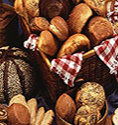She added that controlling blood sugar and the formation of AGE compounds can also decrease the risk of cardiovascular damage associated with diabetes and aging. She explained that high blood sugar accelerates heart disease partly because AGE compounds form in the blood and in the walls of blood vessels. The AGE compounds aggravate atherosclerosis, which produces cholesterol plaques.
The UGA researchers tested for the ability to block AGE compounds in a test tube, but animal studies conducted on the health benefits of spices lend support to their argument. Cinnamon and cinnamon extracts, for example, have been shown to lower blood sugar in mice. Interestingly, cinnamon lowers blood sugar by acting on several different levels, Hargrove said. It slows the emptying of the stomach to reduce sharp rises in blood sugar following meals and improves the effectiveness, or sensitivity, of insulin. It also enhances antioxidant defenses.
Hargrove said their findings suggest it's likely that the herbs and spices they studied will provide similar benefits in animal tests. He points out that because humans have been consuming herbs and spices for thousands of years, they come without the risk of possible side effects that accompany medications.
"Culinary herbs and spices are all generally recognized as safe and have been time-tested in the diet," he said. "Indeed, some of spices and herbals are now sold as food supplements because of their recognized health benefits."
Study co-author Phillip Greenspan, associate professor in the College of Pharmacy, noted that most people don't get their recommended five to nine servings of fruits and vegetables a day. Rather than seasoning their food with salt – which provides no beneficial phenols and has been linked to high blood pressure – he recommends that people use a variety of herbs and spices to help boost the nutritional quality of their meals.
"When you add herbs and spices to food, you definitely provide yourself with additional benefits besides taste," Greenspan said.
Source: University of Georgia
Article abstract: Rebecca P. Dearlove, Phillip Greenspan, Diane K. Hartle, Ruthann B. Swanson, James L. Hargrove. 2008. Inhibition of Protein Glycation by Extracts of Culinary Herbs and Spices. Journal of Medicinal Food. June 2008, 11(2): 275-281.



